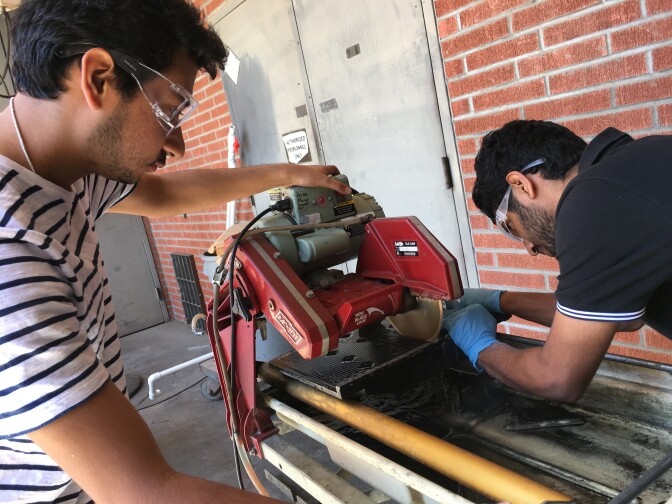Admissions officials at Cal State Long Beach were struck recently when they got their latest batch of applications on April 1.
While there was a slight increase in the number of undergraduate applications received, the decline in graduate applications from some countries was in the double digits: 42 percent drop from India, 9 percent drop from China and a 24 percent drop from Iran.
“Certainly that number is significant, and we didn’t anticipate that large of a drop in those applications for graduate studies,” said Terrence Graham, the campus’s executive director of International Programs.
California State University Fullerton, and the University of California Riverside are seeing similar drops, also from some of the same countries. U.C. saw a drop systemwide.
Graham says his staff heard from applicants wanting to know about violence toward foreigners and about White House policies that could make it harder for them to get a job in the U.S. after graduation.
“We did get emails from concerned students from India saying, 'Should I finish my application? Is there any point in me planning to come?' " Graham said. "We have heard from students from Iran[…] concerns certainly there with a lot of the rhetoric about [President Trump’s travel ban]."
The application decline could be an early warning to higher education institutions about enrollment declines that could dampen the amount of tuition funds they collect each year. Many international students enroll in engineering and business majors. College administrators say these American industries could be weakened as colleges graduate fewer professionals.
Seventy percent of the graduate students in engineering at Cal State Long Beach are international students. Some of them echo the concerns heard by university staff.
Manoj Sampangi Ram - a native of Bangalore, India - is in the first year of the engineering master's program that teaches students how to design and manufacture parts for industries such as aerospace. In the fall he talked to friends in India who wanted to follow in his footsteps at an American university.
“When Trump won they all backed out. Because his rules are very strict, H1B for students,” Sampangi Ram said.
He’s talking about the visa that allows foreigners to stay and work in the U.S. for a limited amount of time. President Trump has pledged to enact limits on the H1B visa and that worries Sampangi Ram.
The application drop at Cal State Long Beach appears to also be happening at campuses in different parts of the nation.
In April, the American Association of Collegiate Registrars and Admissions Officers released results of a survey of 294 college admission officials.
Nearly 40 percent of the institutions represented in the survey reported a drop in applications from international students. According to the report, there are more than 100,000 students from the Middle East enrolled in U.S. higher education, while nearly half a million students from China and India study here.
According to the survey, students who want to study in U.S. universities said they’re concerned that U.S. embassies and consulates will deny them student visas and that the U.S. is becoming less welcoming to foreigners. They also worry the U.S. government will modify visas to restrict travel and employment.
The results, the association said, are early warnings of potential declines rather than definitive proof that fewer students from abroad will enroll in U.S. universities.
At Cal State Long Beach, officials said a drop in foreign student enrollment could reduce class offerings and mean fewer graduates in careers that are key to the U.S. economy.
“The workforce will be impacted much more significantly,” said Forouzan Golshani, dean of the college of engineering. “The reason is that we have relied on foreign-born American-educated graduates in industry and in the faculty ranks in the academy.”
That’s because, he said, so few American-born public school students pursue advanced degrees in science, technology, engineering and math.
If foreign applications continue to drop, Golshani said, American public schools will need to do a better job getting students interested in science, technology, engineering and math careers.
Cal State Long Beach’s international student office has decided to take action on a couple of fronts. They’ve created online videos to send overseas applicants the message that Southern California is a tolerant place where they are welcome.
This campus has nearly 2,000 students from abroad earning a degree, one of the highest number among all 23 Cal State universities. International students pay about double in tuition and fees compared to a California resident.
To counter the expected drop in international student enrollment, Cal State Long Beach is sending recruiters to places they rarely go.
“Latin America, for example, looking at Africa, looking at some other regions that we might not have been putting as many resources into so that we’re less susceptible to those political ups and downs that are part of this business,” said executive director Terrence Graham.
But even in those countries, he said, his staff will likely get similar questions about whether it’s safe to study in the U.S. and whether government policies will allow them to stay and work after graduation.









